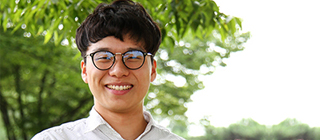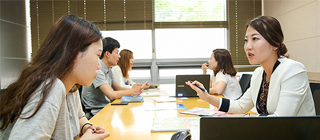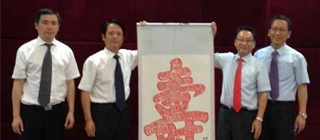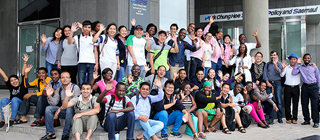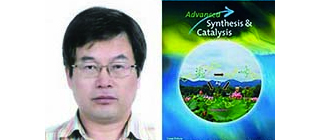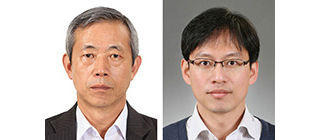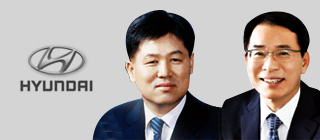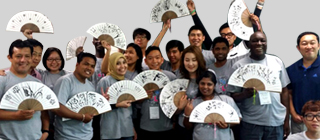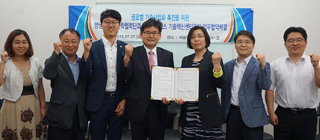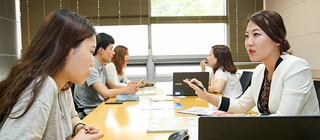-
School of Chemistry senior Park Min-gyu develops next-generation energy source ‘methane’ generation catalyst Achieved low-cost, high efficiency compared to existing catalysts Clue to solving both environmental and energy issues [Sep 9, 2015] An undergraduate student of YU made headlines by publishing his thesis in the world’s most authoritative SCI international academic journal. Park Min-gyu (23) is a senior currently enrolled in the School of Chemistry. His study was recently published in one of the world’s most acclaimed academic journals in the mechanics sector in the upper 1.46% titled, <Energy Conversion and Management (IF), 4.38)>. Park’s paper, ‘Development of Carbon Dioxide Methane Fuel using Double Layer Membrane of Titania (TiO)/Copper-Titania (Cu-TiO)’. It has already been released online and it is scheduled to be published in the journal that will be issued on October 1. Park’s thesis was a study on the production of methane, a main ingredient of natural gases that is receiving attention as a next-generation energy source. Park processed a powder ‘copper-titania’ by adding copper ion that has high conductivity in titania that reacts to light to cause catalyst activation into a dough-form. Then, it was coated with a double layer to use as a carbon dioxide reducing agent. In the past, expensive catalysts such as ruthenium (Ru) or palladium (Pd) in order to create methane by deoxidation of carbon dioxide. However, Park’s study has allowed it to to cut costs drastically and raise efficiency for the process of producing methane using carbon dioxide. The issue of exhaustion of energy due to the continued use of fossil fuels and the global warming issue resulting from the increase of carbon dioxide have recently become global issues. Therefore, this research, which achieved cheaper costs and higher efficiency for generating methane through the deoxidation of carbon dioxide is receiving high levels of attention as it provided a first step to simultaneously solve both environmental and energy issues. YU Professor of Chemistry and Biochemistry Kang Mi-sook (46), who participated in this study as a correspondence author, said, “This study provided a technical basis to convert carbon dioxide, which is the main cause of global warming, into the useful fuel of methane using photochemistry methods.” She added, “It will contribute in the development of an eco-friendly natural circulation system that will be able to solve the energy depletion and environment restoration issues that the world will is now facing.” In fact, the YU School of Chemistry and Biochemistry Mineral Materials Chemical Research Lab (Advisor Kang Mi-sook) is already well known for its research capacities. Last year, undergraduate students published five papers in SCI level journals. Also undergraduate and graduates received a total of 12 awards in various academic conferences held both in Korea and abroad such as the 2013 ‘Nano Korea 2013’ excellent presentation award and the ‘ISGMA 2013’ excellent presentation award. Furthermore, students won the ‘Graduate School Catalyst Research Award’, which is given to graduate students with exceptional research achievements annually by the Korean Institute of Chemical Engineers, for three consecutive years. Park Min-gyu, who said that he is highly interested in developing materials useful to humans while focusing mainly on research in catalysts, stated, “I am still in my infancy in terms of research capacities as I am an undergraduate. I was lucky with this research because I just followed the instructions of my professor.” He added, “After I graduate, I want to enroll in graduate school and study and research the catalyst field more in depth.”
-
Selected as Donga Ilbo ‘2015 Youth Dream University’ Praises for the YU career development process (CRM) Succeeded in constructing circulating start-up ecosystem such as stark rise in start-up clubs in the past 3 years [Sep 8, 2015] <Students are receiving counseling from employment/start-up consultants. (Touring employment career consulting center program)> YU’s excellent employment/start-up support capacities were once again proven. YU was assessed as ‘excellent university’ in the ‘2015 Youth Dream College’ evaluations conducted by Donga Ilbo and Channel A together with Deloitte Consulting. The Youth Dream College, which is in its third year this year, assesses how efficiently and assertively upper-ranked colleges with excellent education conditions provide support for student employment and start-ups. The Youth Dream College was selected based on the satisfaction level of students and college infrastructure for 52 four-year universities in the five areas of ▲counseling support ▲information support ▲opportunity support ▲curriculum ▲start-up support. YU was selected as a ‘Youth Dream College’ last year and received an upgraded assessment to ‘Excellent Youth Dream College’ this year and, thus became a ‘Youth Dream College’ for two consecutive years. When excluding employment rates and assessing only the university’s employment/start-up support capacities, YU was found to be in the top ten nationwide. YU’s assertive employment support that is systematically carried out from the freshmen and sophomore grades stands out the most. YU established a career development program (Career Road Map, ‘CRM’) for students to set their goals upon enrollment and to systematically design their college life. In order to make it possible to continuously set career paths and develop experiences from the freshman to senior year, it operates a program based on CRM that encompasses not only general education and major education, but also extracurricular education courses. Furthermore, in order to identify the salary and employment region desired by students, as well as their aptitudes, students are required to answer each item in this school’s unique CRM from their freshman year. When adding career experience and qualification certificates every school year, it matches these to suggest even exact company names. The employment consultants provide counseling based on these concrete consulting materials. <2014 YU Start-up Culture Road Show> YU’s distinguished start-up education was judged to be a successful model for the activation of student start-ups. Step-by-step start-up education programs are offered according to the level of users to strengthen the start-up capacities of students. Various start-up education courses are provided to help students become interested in starting up businesses and eventually actually starting their own venture. In particular, the number of start-up clubs increased four-fold in the past three years. The 14 clubs in 2012 increased to 61 last year. The start-up club is very encouraging in that it helps students come up with their own ideas and actively prepare to start their own business. YU Employment Support Team Director Kwon Oh-sang said, “We have developed and are operating various career management programs and capacity strengthening programs in various departments in our university to help student successfully take their first step into society,” and added, “If students show more interest in such programs and utilize them, their college life will be very fulfilling.”
-
YU President Noh Seok-kyun visits Chongqing University, Chongqing University of Science and Technology, Sichuan International Studies University and the People’s Government of Changshou District Agreed on academic exchange/student exchange programs and to attract international students from China Expanded global partnership in 2015 to Europe, Central and South America and China [August 24, 2015] <YU President Noh Seok-kyun visited the People’s Government of Changshou District China to discuss inviting excellent international students from China and to cooperate on exchange the local universities. YU (President Noh Seok-kyun) signed MOUs with a number of universities and government offices for exchange as it expands its global partnership with China. Mr. Noh and his group visited Chongqing University of Science and Technology, Chongqing University, Sichuan International Studies University, and the People’s Government of Changshou District, Chongqing from the 20th to the 23rd of last month signing MOUs for the operation of academic exchange and exchange student programs. In particular, Sichuan International Studies University pledged cooperation in various types of academic exchange such as the ‘undergraduate 3+1’ (three years study at Sichuan International Studies University and one year study at YU) course, ‘graduate school 1+1’ (one year of graduate school at Sichuan International Studies University, one year at YU graduate school, and then graduation at their respective university), and simultaneous interpretation courses. Chongqing University is a national university 50,000 students. It is comprised of 28 colleges, 90 undergraduate courses, 256 master’s degree courses and 133 PhD courses. It is a national university under the Education Ministry with its environmental architecture, engineering, technology and business sectors being in the top 10 of China. Chongqing University of Science and Technology has excellent capacities in the metal material engineering and mechanical processing sectors, and exchange with YU is expected to become highly active in fields of interest such as the Baja SAE Korea held annually at YU. Agreements were made with the People’s Government of Changshou District, Chongqing for attracting international students from China and for exchange with local universities. Mr. Noh visited District Governor Zhao Shiqing and government officials asking for continued cooperation for signing sisterhood relations and exchanging with local universities in Chongqing, and to attract excellent international students from China. Earlier in February, Mr. Noh visited prestigious universities and major research institutes in Europe such as Oxford University in England, University of Strasbourg in France, and Fraunhofer Gesellschaft in Germany to sign student exchange and joint research agreements. In May, he visited the National Autonomous University of Mexico and Technologico de Monterrey to agree not only for academic exchange such as professor and student exchange programs, but also for cultural exchange programs of the two nations as YU continuously expands its global partnership in 2015 to Europe, Central and South America, and China.
-
New International Student Competition Rate 8.9 to 1 for Park Chung Hee School of Policy and Saemaul Increased application among high-ranking senior officials and professionals such as former assistant vice-minister of Ecuador International demand for ‘Saemaul Development’ rises [August 31, 2015] <Students of the Park Chung Hee School of Policy and Saemaul take group photo in front of the school.> The world is gathering at YU (President Noh Seok-kyun). There has been a stark increase in international demand among those who want to become experts in international development by leraning the ‘Saemaul Science’ and the knowhow of Korea’s Saemaul development. Applications for the second part of 2015 ended recently for international students wishing to come to the Park Chung Hee School of Policy and Saemaul (Director Park Seung-woo, hereinafter ‘Saemaul Graduate School’). In result, a total of 277 people from 45 countries applied for the 31 spaces for a high competition rate of 8.9 to 1. This is the highest competition rate since inviting international students for the first time in March 2012. It has been making news as senior officials from around the world applied. Former assistant vice-minister Maria Bermeo (female) of Ecuador’s Education and Science Technology Ministry stands out the most. Despite her young age of 30, Miss Bermeo earned her master’s degree and served as a professor, while also serving as an aide to the Minister of Education and Science Technology, and serving as assistant vice-minister until recently from 2013. She is said to be a core next-generation leader of Ecuador. She said that the reason why she applied was because she “wanted to learn international development from a global perspective and Korea’s development experience at the YU Saemaul Graduate School and contribute to the social development of Ecuador.” Also, eleven countries such as East Timor, Jordan, Palestine (Asia), South Africa, Sierra Leone, Egypt (Africa), Banuatu (Oceania), Azerbaijan (Europe), Mexico, Costa Rica, Peru (Latin America) also applied for the first time, showing the explosive increase in international interest for Saemaul development. This is assessed to be highly influenced by graduates who are actively working in their own governments and society as experts in Saemaul development after graduating from the YU Saemaul Graduate School. Students who graduated from Saemaul Graduate School have been highly active in all areas of emerging countries including Gasana Richard (40), who was recently elected as mayor of Gatsibo. It is also judged that a seminar held for diplomatic envoys of 24 countries in Seoul last April also had a big impact. International Development Cooperation Director (Vice-President) Choi Wae-chul, who was the first dean of the YU Saemaul Graduate School, said, “It is a wonder that the Saemaul Graduate School, which began with just 15 students in its first year, grew so rapidly in such a short time.” He added, “This is evidence that the world recognizes the excellence of the Saemaul development program amassed by YU.” The YU Saemaul Graduate School will announce the final passing students for the second half of 2015 on September 4 (Friday). A total of 85 new students including 31 international students and 54 new students for the consigned education program of the Korea International Cooperation Agency (KOICA), Korea Environmental Industry and Technology Institute (KEITI) and the international organization, Asian Forest Cooperation Organization (AFOCO) will being their master’s degree program for one year and six months starting in October. Meanwhile, the YU Park Chung Hee School of Policy and Saemaul was established in November 2011 to share the Saemaul Undong and Korea’s development experience to public officials and workers in the public sector in emerging countries, while fostering them into global Saemaul leaders. A total of 258 international students from 52 countries were admitted and as of August 2015, 125 received their master’s degree. The Park Chung Hee School of Policy and Saemaul was selected for the KOICA ‘Regional Community Development Instructor Fostering Master’s Degree Course’ by KOICA in March 2014, and in April 2015, it was selected as the consigned institute for KEITI’s ‘Master’s Degree Course for Public Employees in Emerging Countries’.
-
Three theses published in 2015 selected as poster paper for authoritative international academic journals Development of safe, economic and eco-friendly organic response methods Can be utilized in manufacturing various everyday products such as pharmaceuticals, electronic materials and perfumes [August 24, 2015] <A study recently published by Professor Lee Yong-rok was selected as the poster paper of a world acclaimed journal in the applied chemistry field> Three papers that Professor of Chemistry Lee Yong-rok (56) recently published were all selected as poster papers for authoritative international academic journals. The study ‘Construction of Various Types of Azopyrazole Cyclic Compounds using Silver Catalysts’ by Professor Lee, a leader in the organic compound field, was selected as the front page paper (photo above) and VIP study in the latest issue (August) of <Advanced Synthesis & Catalysis (Impact Factor 5.663)>, which is in the top 1.4% of the applied chemistry field. In May, his papers such as ‘New Synthesis of Iron-Palladium Bimetal Nano-Catalysis and Application in Cyclic Reaction’ and ‘Synthesis of Anthraquinone and Tetrasendion of Various Forms using Organic Catalysts’ were selected as the end poster paper of <Catalysis Science &Technology, IF=5.426,> (bottom left) and <Chemical Communications, IF=6.834> (bottom right), respectively. Through research, Professor Lee developed new organic reaction techniques that were never reported in the past using various types of catalysts. It has been assessed that through such organic reaction methods, physiological activities and functional compounds were easily and simply synthesized. Professor Lee said, “The developed compounding method can be used safely using catalysts that can be easily purchased, and furthermore, because it is environment friendly and economical, it can be used widely in precision chemical product manufacturing such as new pharmaceuticals, electronic materials, dyes, and perfumes, so it is expected to contribute to national industries and economical development.” He said, “I would like to turn this honor to the graduate school students from Nepal, China, Vietnam and India who diligently participated in this study” as he expressed his gratitude. He also announced his plans to continue working in organic compound research such as pursuing joint research with other institutes to develop new drugs and electronic materials. Professor lee, who was appointed as a professor of the YU School of Chemical Engineering in September 1995 published over 200 studies in SCI journals by conducting research on new physiological activation materials and functional organic molecular synthesis. He has also registered 36 patents. He has been actively engaged in research and in just the past two years, he published 50 papers in acclaimed international academic journals such as <Organic Letters, IF=6364>, the most authoritative academic journal in the organic chemicals sector published by the American Chemistry Association, and <Green Chemistry, IF=8.02> published by the British Chemistry Association. For his efforts, he was awarded the Academic Progress Award by the Korean Chemistry Association in 2008, and was selected as the best reviewer for two straight years in 213 and 2014 from <Tetrahedron>, an acclaimed academic journal in organic chemistry by Elsevier, the world’s largest publisher of academic journals. In <Noteworthy Chemistry> published by the American Chemistry Association in 2014, Professor Lee’s research was introduced in detail. Last year, he was selected as an excellent evaluator of the basic research projects of the National Research Foundation and he has also been continuously active as a judge for the world college evaluations by Britain’s college evaluation institute, QS. He is currently participating in the National Research Foundation’s Junior Researcher Support Project, Nano-Material Technology Development Project, and the Focus Research Center Projects. This study was carried out as part of this project.
-
Professor Lee Jong-wook awarded the Gwangjeong Zoology Award for discovering 600 unrecorded and new organisms and for his contributions in zoology Professor Seok Ho-young received ‘Presidential Citation’ for contributions to the development of the nation and society through environmental conservation activities [August 11, 2015] <School of Biotechnology Professors Lee Jong-wook (left) and Seok Ho-young> Professors of the YU School of Biotechnology made great achievements by winning an academic award and presidential citation. Professor Lee Jong-wook (6) won the Gwanjeong Zoology Award. The Gwanjeong Zoology Award was founded with investments made by the family of the late Gwanjeong Cho Bok-seong, who was a pioneer of Korean biology, to remember his academic spirit and achievements. This is an academic award given to scholars with excellent research achievements in the zoology field every two years from 1980. This is the 18th awards this year. Professor Lee Jong-wook has been actively engaged in research for over 40 years with over 200 research papers in the biology field being published in prominent domestic and international academic journals. He found over 600 species of unrecorded and new organisms, and thus received the Gwanjeong Zoology Award in recognition of his contributions to the development of Korean zoology. After earning his PhD in zoology at Korea University, Professor Lee has been serving as a professor at YU from March 1986. He served as the dean at the YU Department of Biology, researcher at the American Entomological Institute (AEI), director at the Korean Society of Applied Entomology, and member of the Gyeongsangbuk-do Cultural Heritage Committee. He is also active as an auditor for the Entomological Society of Korea, director of the Korean Society of Zoology, operating committee member of the Korean Biodiversity Association, and editor of the Insecta Koreana Compilation Committee. Prior to this in July, Professor Seok Ho-young (45) was awarded a presidential citation for his contribution to national development through environmental conservation activities at the National Nakdong River Bio Resources Center opening ceremony held in Sangju. Professor Seok Ho-young has contributed greatly in establishing research technologies related to national bio resource preservation and diversity identification. Professor Seok has been participating as a researcher in research projects on the conservation and diversity of bio resources carried out by the National Bio Resource Center since 2011 such as research on systems of major fish resources, analytical research on genetic diversity of bio resources, and drafting wild invertebrates in the Korean Peninsula and barcode DNA analysis. In particular, he contributed to the establishment of the National Nakdong River Bio Resource Center by providing basic consulting and his activities as committee members of the Nakdong River Bio Resource Center from 2011 to 2014. He also provided consultations for the National Bio Resource Center, Korea Rural Community Corporation, National Fisheries Research & Development Institute, Cultural Heritage Administration, and other institutes under the Ministry of Environment as a consultant for government and research institutes. In 2009 and 2013, also participated in the Unmunsan Natural Scenery Preservation Area selection ecological survey project led by the Daegu Provincial Environmental Office, as well as its follow-up monitoring project, as he actively participated in regional ecological protection projects. After earning his PhD at the Seoul National University Department of Bio Sciences, Professor Seok worked as a researcher at the University of Western Ontario and University of Toronto, and then at Johns Hopkins Medicine in the US before being appointed as a professor at YU in March 2009.
-
Following Seoul National University, third place together with Yonsei University and Hanyang University Kang Hak-seo, CEO of Hyundai Steel and Jung Il-soo, CEO of Hyundai Powertech Sixth place for graduating CEOs among the top 100 companies in Korea [July 23, 20153] Universities of Hyundai Group CEOs University Major No. Percentage No. Percentage SNU 8 36.4% Engineering 10 45.5% Korea University 3 13.6% Business / Economy 8 36.4% Yonsei University 2 9.1% Law 1 4.5% Hanyang University 2 9.1% Social Science 1 YU 2 9.1% Humanities 1 4.5% Others 5 22.7% Others 1 4.5% Source: CEO Score / Units: persons YU (President Noh Seok-kyun) was ranked third place nationwide in the Hyundai Group CEO universities, which is the second largest conglomerate in Korea. CEO Score (CEO Park Joo-geun), a business performance evaluation site, announced the results of analyzing the universities from which the 22 CEOs of the 17 Hyundai Group CEOs. YU graduated two CEOs, becoming the university with the third most CEOs for Hyundai Group companies following Seoul National University (8) and Korea University (3). Yonsei University and Hanyang University also graduate two CEOs each, thus ranking hird place together with YU. Among the Hyundai Motor Group CEOs, those from YU are Kang Hak-seo (60, left0 and Hyundai Steel Jung Il-soo (57, right). Mr. Kang Hak-seo is from the Department of Business Administration class of 79 and served as the VP and CEO of Hyundai Rotem, then served as the VP of Hyundai Steel and was appointed as the CEO of Hyundai Steel in October of last year. Mr. Jung Il-soo was from the YU Department of Mechanical Engineering class of 76 and has been serving as the CEO of Hyundai Powertech since August 2013. Among the Hyundai Motor Group CEOs, those from YU are Kang Hak-seo (60, left0 and Hyundai Steel Jung Il-soo (57, right). Mr. Kang Hak-seo is from the Department of Business Administration class of 79 and served as the VP and CEO of Hyundai Rotem, then served as the VP of Hyundai Steel and was appointed as the CEO of Hyundai Steel in October of last year. Mr. Jung Il-soo was from the YU Department of Mechanical Engineering class of 76 and has been serving as the CEO of Hyundai Powertech since August 2013. Meanwhile, YU also placed sixth place in the CEO graduating universities of the top 100 companies in Korea according to analysis and presentation made by the April issue of <Modern Management>. In the ‘KOSDAQ listed CEO status’ of KOSDAQ, YU also ranked sixth place for 2013 and 2014, reconfirming the alumni power of YU that is leading the Korean financial sector.
-
Public Officials of Emerging Countries Learn Korean Language and Culture at YU Consigned by KOICA study program, public officials from seven countries to study for eight weeks until September 6 Hangeul education, special lecture on Korean politics, economics, society and history, field trip to historical sites and company sites Various cultural experience education such as samul-nori, calligraphy, wearing Korean costumes, cooking classes [July 21, 2015] <Public officials from 7 countries learn Korean at YU.> Public officials from emerging countries visited YU (President Noh Seok-kyun) to learn the Korean language and culture. Thirteen public officials from seven countries such as Nigeria, Laos, Mongolia, Vietnam Sri Lanka, Indonesia and Peru came to YU to learn the Korean language and Korean culture. This study program was made possible as the YU Korean Language Education Center (Director Jeon Jung-gi) was selected for the ‘Korean Language and Korean Culture Understanding’ project hosted by the Korea International Cooperation Agency (KOICA). This program, which started on the 13th, will continue for eight weeks until September 6. This study program was composed of Korean language education and also special lectures on Korean politics, economy, social systems and history, and offers various types of Korean culture experience education and field trip programs. Particularly, in the Korean language education included in this study program, studies learned the basic consonants and vowels, vocabulary and grammar, as well as writing text messages, introducing family members, presentations on hobbies and travels, as well as other various Hangeul writing and speaking projects in order to concentrate on practical Korean language education for using Korean as a foreigner. In addition to the education and special lectures held in classrooms, various experience activities and field trips to actually see and experience Korean culture is scheduled, gathering high anticipations from participants. In addition to experience-based education of the colorful traditional culture of Korea such as samul-nori, calligraphy, Korean cuisine classes, natural dyes, pottery, traditional archery, and wearing traditional Korean garments, they will also visit the famous sites of Korea such as the YU Folk Village, Gyeongju Yangdong Village, Cheomseongdae, Cheonmachong, and the Cheongdo Saemaul Undong Origin Memorial Hall. They will also visit companies and tourist attractions that will show Korea’s development such as Gumi Samsung Electronics, POSCO, Busan Dongbaek Island APEC House, and the Haeundae Aquarium. In the last week, the students will use the overall understanding of Korea that they learned through the program to make presentations on detailed actual plans that could be applied in their home countries and hold discussions. Nilam Putri, Dewant (37), a public employee of the Indonesian Bureau of Secretariat for Chairmanship said, “I participated in this study program because I wanted to have better exchange with Koreans living in Indonesia. It is my first visit to Korea, but I have been highly interested in the passion and lifestyle of Korea, which made great developments in a short period of time after independence from the colonial age that Indonesia also experience.” He added, “I hope to not only learn the Korean language and Korean culture through this program, but also, I will think about ways to apply Korean culture in Indonesia.” YU Korean Language Education Center Director (Professor of International Commerce) Jeon Jeong-gi, who is in charge of this program, said, “This program is very significant in that it is basic training to foster working-level public employees who plan and execute national policies into ‘Korea experts’. He added, ”As an international cooperation leading university, YU will continue to participate in such emerging country public employee fostering programs through various methods.“
-
Korea Technology Finance Corporation and Shinhan Bank agrees to provide technical evaluation, guarantee and financial consulting support Signed MOU with global technology transfer consulting institute Expected to accelerate overseas technical marketing and commercialization [July 20, 2015] <YU signs work MOU for financial support with KIBO and Shinhan Bank.> YU (President Noh Seok-kyun) is pushing forward with transferring the intellectual properties and outstanding technologies possessed by the university to companies, while also accelerating technological commercialization. On the 9th, the YU Industry Academic Cooperation Team (Director Park Jin-ho) signed a three-way work MOU with the Korea Technology Finance Corporation Daegu Office (Director Kwak Young-cheol) and Shinhan Bank Daegu-Gyeongbuk Headquarters (Director Sohn Hyun-taek) to provide support to faculty/student business starters and venture companies and family companies within the Industry Academic Cooperation Team. With this MOU, KIBO will provide support in ways of technical evaluation and guarantee for faculty and student business starters, and YU family companies, and Shinhan Bank is planning to provide financial consulting to them. Start-ups will receive support by each institute in relation to fund procurement and financial management, and it is thus expected that commercialization of the outstanding technologies possessed by the college will help activate student start-ups. Prior to this, the YU Industry Academic Cooperation Team signed an MOU with the Steinbeis Technology Innovation Center (CEO Lee Gi-wang) on the 7th. The Steinbeis Foundation is a world acclaimed technology support consulting institute that supports commercialization and enhances economic feasibility by transferring excellent technologies possessed by universities and research centers. It is comprised of over 1,000 centers around the world with a total of upwards of 6,000 experts. <YU signed a work MOU with ‘Steinbeis’, a world-famous technology transfer and commercialization consulting company.> With the signing of this agreement, the two institutes agreed to cooperate for finding cooperative partners and mediated technological transfers for the commercialization of the intellectual properties and technologies possessed by YU. In particular, through this MOU, YU has teamed up with a world famous technology transfer consulting institute, and it is expected that they will accelerate preemptive overseas technological marketing and commercialization for the outstanding technologies possessed by the university. YU is currently engaging in overseas technology transfer marketing for a number of technologies in the bio fields, and some technologies are already in the process of overseas technological transfers. YU Industrial Cooperation Team Director (Professor of Chemical Engineering) Park Jin-ho said, “This year, YU was selected for government funded projects, and it is pursuing technology transfer and commercialization such as signing MOUs with specialized institutes in different sectors.” He added, “The paradigm shift focusing on technological commercialization pursued by YU is the start of the creative economy and it will provide the growth engine for the economic development of Korea.” Meanwhile, YU was selected for the ‘College Creative Asset Commercialization Support Project’ hosted by the Ministry of Education and the National Research Foundation last May. YU made a consortium with Kyungpook National University and was ranked in the Daegu-Gangwon region for the industry-academic cooperation team innovative project sector, thus received over 2.3 billion won to pursue technology transfer and commercialization projects for three years.
-
Operate ‘Career/Employment Consulting Center’ Career/employment consulting, hiring information, application documents, interview consulting, etc Operate concentrated career and employment consulting customized to each department during the school year [July 22, 2015] <Students are receiving counseling from consultants at the ‘Mobile Career/Employment Consulting Center’.> The employment capacity strengthening program that YU (President Noh Seok-kyun) began offering for the summer vacation is receiving good responses from students. The YU Student Capacity Development Office is operating the ‘Mobile Career/Employment Consulting Center’ to help students set career paths fitting their aptitude and to help them land jobs. Counseling is offered at the Group Study Centers in the Main Library and Second Library, which are frequently visited by students, from 10 a.m. until 5 p.m. during the vacation period. Faculty and outside consultants specializing in employment are providing information and counseling for career paths and employment to students. They are providing career counseling and information on duties at work to younger students, while providing hiring information, employment counseling, application document clinics for resumes and cover letters, as well as interview information for different companies and mock interview programs for students preparing to find jobs. . This has been very popular among students. Over 300 students have visited the consulting center that started on the 1st, showing the higher than expected passion for employment. YU Senior in Mechanical Engineering Choi Gyeong-jae (24), who was recently selected as an intern for POSCO and will be working at POSCO as an intern for four weeks starting on the 27th said, “Counseling from the consulting center that ranged from writing resumes to preparing for interviews helped me greatly,” and added, “I will gain experience as an intern during vacation, and work hard during my last semester and land a job before I graduate.” It is expected that YU’s assertive employment program that goes to where students are instead of waiting for students to come will help in the early career development and strengthening of employment capacities. YU Student Capacity Development Office Director, Professor Kim Young-take (Mobile Information Communication Engineering) said, “It’s good for students to prepare to look for employment on their own, but by receiving assistance from experts, they will be able to make preparations more systematically and in detail.” He added, “As we are developing various programs to strengthen capacities of students and help them in landing their desired jobs, we hope that more students will take full advantage of such programs.” Meanwhile, YU is planning to operate the ‘Mobile Consulting Center’ until August 14. The school is also planning to operate the ‘Customized Concentrated Career/Employment Consulting’ throughout the semester to help students with employment. Employment consultants will be placed in each department to provide information for career paths and duties to younger students fitting to their major, while providing employment information and operating employment support programs to senior-level students.
